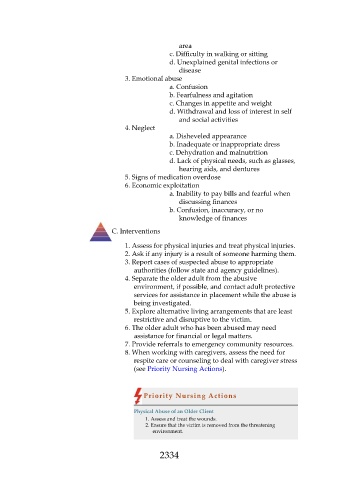Page 2334 - Saunders Comprehensive Review For NCLEX-RN
P. 2334
area
c. Difficulty in walking or sitting
d. Unexplained genital infections or
disease
3. Emotional abuse
a. Confusion
b. Fearfulness and agitation
c. Changes in appetite and weight
d. Withdrawal and loss of interest in self
and social activities
4. Neglect
a. Disheveled appearance
b. Inadequate or inappropriate dress
c. Dehydration and malnutrition
d. Lack of physical needs, such as glasses,
hearing aids, and dentures
5. Signs of medication overdose
6. Economic exploitation
a. Inability to pay bills and fearful when
discussing finances
b. Confusion, inaccuracy, or no
knowledge of finances
C. Interventions
1. Assess for physical injuries and treat physical injuries.
2. Ask if any injury is a result of someone harming them.
3. Report cases of suspected abuse to appropriate
authorities (follow state and agency guidelines).
4. Separate the older adult from the abusive
environment, if possible, and contact adult protective
services for assistance in placement while the abuse is
being investigated.
5. Explore alternative living arrangements that are least
restrictive and disruptive to the victim.
6. The older adult who has been abused may need
assistance for financial or legal matters.
7. Provide referrals to emergency community resources.
8. When working with caregivers, assess the need for
respite care or counseling to deal with caregiver stress
(see Priority Nursing Actions).
Priority Nursing Actions
Physical Abuse of an Older Client
1. Assess and treat the wounds.
2. Ensure that the victim is removed from the threatening
environment.
2334

